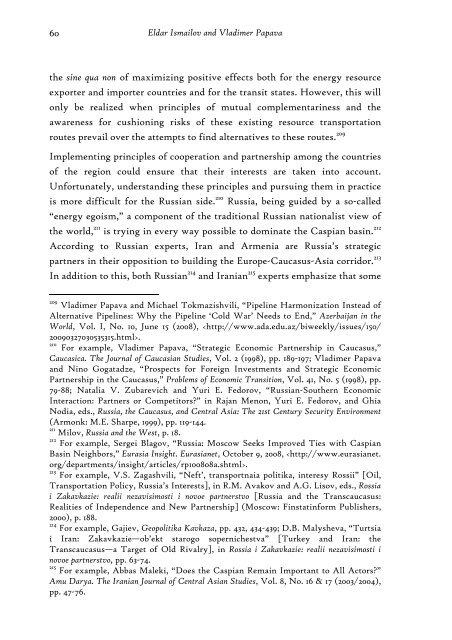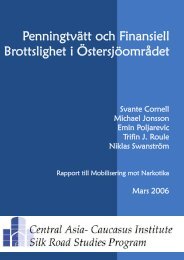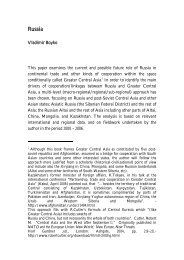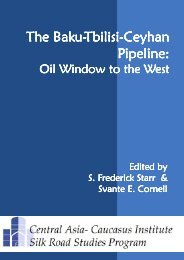Eurasianism and the Concept of Central Caucaso-Asia
Eurasianism and the Concept of Central Caucaso-Asia
Eurasianism and the Concept of Central Caucaso-Asia
You also want an ePaper? Increase the reach of your titles
YUMPU automatically turns print PDFs into web optimized ePapers that Google loves.
60<br />
Eldar Ismailov <strong>and</strong> Vladimer Papava<br />
<strong>the</strong> sine qua non <strong>of</strong> maximizing positive effects both for <strong>the</strong> energy resource<br />
exporter <strong>and</strong> importer countries <strong>and</strong> for <strong>the</strong> transit states. However, this will<br />
only be realized when principles <strong>of</strong> mutual complementariness <strong>and</strong> <strong>the</strong><br />
awareness for cushioning risks <strong>of</strong> <strong>the</strong>se existing resource transportation<br />
routes prevail over <strong>the</strong> attempts to find alternatives to <strong>the</strong>se routes. 209<br />
Implementing principles <strong>of</strong> cooperation <strong>and</strong> partnership among <strong>the</strong> countries<br />
<strong>of</strong> <strong>the</strong> region could ensure that <strong>the</strong>ir interests are taken into account.<br />
Unfortunately, underst<strong>and</strong>ing <strong>the</strong>se principles <strong>and</strong> pursuing <strong>the</strong>m in practice<br />
is more difficult for <strong>the</strong> Russian side. 210 Russia, being guided by a so-called<br />
“energy egoism,” a component <strong>of</strong> <strong>the</strong> traditional Russian nationalist view <strong>of</strong><br />
<strong>the</strong> world, 211 is trying in every way possible to dominate <strong>the</strong> Caspian basin. 212<br />
According to Russian experts, Iran <strong>and</strong> Armenia are Russia’s strategic<br />
partners in <strong>the</strong>ir opposition to building <strong>the</strong> Europe-Caucasus-<strong>Asia</strong> corridor. 213<br />
In addition to this, both Russian 214 <strong>and</strong> Iranian 215 experts emphasize that some<br />
209 Vladimer Papava <strong>and</strong> Michael Tokmazishvili, “Pipeline Harmonization Instead <strong>of</strong><br />
Alternative Pipelines: Why <strong>the</strong> Pipeline ‘Cold War’ Needs to End,” Azerbaijan in <strong>the</strong><br />
World, Vol. I, No. 10, June 15 (2008), .<br />
210 For example, Vladimer Papava, “Strategic Economic Partnership in Caucasus,”<br />
Caucasica. The Journal <strong>of</strong> Caucasian Studies, Vol. 2 (1998), pp. 189-197; Vladimer Papava<br />
<strong>and</strong> Nino Gogatadze, “Prospects for Foreign Investments <strong>and</strong> Strategic Economic<br />
Partnership in <strong>the</strong> Caucasus,” Problems <strong>of</strong> Economic Transition, Vol. 41, No. 5 (1998), pp.<br />
79-88; Natalia V. Zubarevich <strong>and</strong> Yuri E. Fedorov, “Russian-Sou<strong>the</strong>rn Economic<br />
Interaction: Partners or Competitors?” in Rajan Menon, Yuri E. Fedorov, <strong>and</strong> Ghia<br />
Nodia, eds., Russia, <strong>the</strong> Caucasus, <strong>and</strong> <strong>Central</strong> <strong>Asia</strong>: The 21st Century Security Environment<br />
(Armonk: M.E. Sharpe, 1999), pp. 119-144.<br />
211 Milov, Russia <strong>and</strong> <strong>the</strong> West, p. 18.<br />
212 For example, Sergei Blagov, “Russia: Moscow Seeks Improved Ties with Caspian<br />
Basin Neighbors,” Eurasia Insight. Eurasianet, October 9, 2008, .<br />
213 For example, V.S. Zagashvili, “Neft’, transportnaia politika, interesy Rossii” [Oil,<br />
Transportation Policy, Russia’s Interests], in R.M. Avakov <strong>and</strong> A.G. Lisov, eds., Rossia<br />
i Zakavkazie: realii nezavisimosti i novoe partnerstvo [Russia <strong>and</strong> <strong>the</strong> Transcaucasus:<br />
Realities <strong>of</strong> Independence <strong>and</strong> New Partnership] (Moscow: Finstatinform Publishers,<br />
2000), p. 188.<br />
214 For example, Gajiev, Geopolitika Kavkaza, pp. 432, 434-439; D.B. Malysheva, “Turtsia<br />
i Iran: Zakavkazie—ob’ekt starogo sopernichestva” [Turkey <strong>and</strong> Iran: <strong>the</strong><br />
Transcaucasus—a Target <strong>of</strong> Old Rivalry], in Rossia i Zakavkazie: realii nezavisimosti i<br />
novoe partnerstvo, pp. 63-74.<br />
215 For example, Abbas Maleki, “Does <strong>the</strong> Caspian Remain Important to All Actors?”<br />
Amu Darya. The Iranian Journal <strong>of</strong> <strong>Central</strong> <strong>Asia</strong>n Studies, Vol. 8, No. 16 & 17 (2003/2004),<br />
pp. 47-76.






